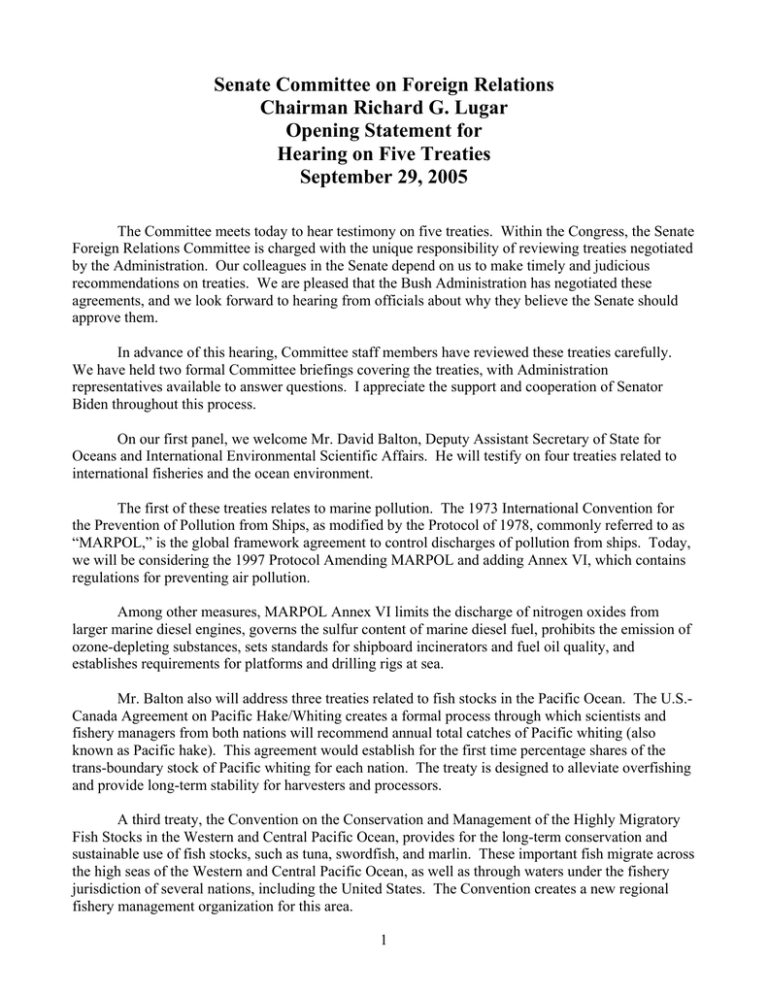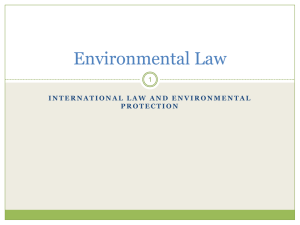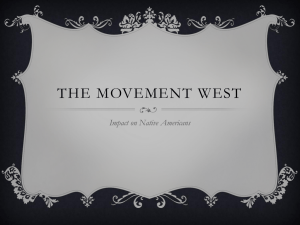Senate Committee on Foreign Relations Chairman Richard G. Lugar Opening Statement for
advertisement

Senate Committee on Foreign Relations Chairman Richard G. Lugar Opening Statement for Hearing on Five Treaties September 29, 2005 The Committee meets today to hear testimony on five treaties. Within the Congress, the Senate Foreign Relations Committee is charged with the unique responsibility of reviewing treaties negotiated by the Administration. Our colleagues in the Senate depend on us to make timely and judicious recommendations on treaties. We are pleased that the Bush Administration has negotiated these agreements, and we look forward to hearing from officials about why they believe the Senate should approve them. In advance of this hearing, Committee staff members have reviewed these treaties carefully. We have held two formal Committee briefings covering the treaties, with Administration representatives available to answer questions. I appreciate the support and cooperation of Senator Biden throughout this process. On our first panel, we welcome Mr. David Balton, Deputy Assistant Secretary of State for Oceans and International Environmental Scientific Affairs. He will testify on four treaties related to international fisheries and the ocean environment. The first of these treaties relates to marine pollution. The 1973 International Convention for the Prevention of Pollution from Ships, as modified by the Protocol of 1978, commonly referred to as “MARPOL,” is the global framework agreement to control discharges of pollution from ships. Today, we will be considering the 1997 Protocol Amending MARPOL and adding Annex VI, which contains regulations for preventing air pollution. Among other measures, MARPOL Annex VI limits the discharge of nitrogen oxides from larger marine diesel engines, governs the sulfur content of marine diesel fuel, prohibits the emission of ozone-depleting substances, sets standards for shipboard incinerators and fuel oil quality, and establishes requirements for platforms and drilling rigs at sea. Mr. Balton also will address three treaties related to fish stocks in the Pacific Ocean. The U.S.Canada Agreement on Pacific Hake/Whiting creates a formal process through which scientists and fishery managers from both nations will recommend annual total catches of Pacific whiting (also known as Pacific hake). This agreement would establish for the first time percentage shares of the trans-boundary stock of Pacific whiting for each nation. The treaty is designed to alleviate overfishing and provide long-term stability for harvesters and processors. A third treaty, the Convention on the Conservation and Management of the Highly Migratory Fish Stocks in the Western and Central Pacific Ocean, provides for the long-term conservation and sustainable use of fish stocks, such as tuna, swordfish, and marlin. These important fish migrate across the high seas of the Western and Central Pacific Ocean, as well as through waters under the fishery jurisdiction of several nations, including the United States. The Convention creates a new regional fishery management organization for this area. 1 Similarly, the Convention for the Strengthening of the Inter-American Tropical Tuna Commission, known as the “Antigua Convention,” provides for the long-term conservation and sustainable use of highly migratory fish stocks, such as tuna and swordfish, which range across the Eastern Pacific. The Antigua Convention would update a 1949 Convention to reflect improved methods in managing international marine resources. On our second panel, the Committee will hear testimony from Warren Stern, Senior Coordinator for Nuclear Safety at the Department of State, and Mr. James Bennett McRae, Assistant General Counsel for Civilian Nuclear Programs at the Department of Energy. They will discuss the Convention on Supplementary Compensation for Nuclear Damage, known as the “CSC.” Adopted at a conference convened by the International Atomic Energy Agency, the CSC is an effort to create a global nuclear civil liability regime compatible with the existing U.S. nuclear civil liability law under the Price-Anderson Act. The Price-Anderson Act, which was recently reauthorized by Congress in the comprehensive energy bill, has set the standard for nuclear liability in the United States for many years. The CSC is designed to limit the liability now facing U.S. suppliers of nuclear technology with respect to their activities in foreign markets. This treaty would help U.S. companies export nuclear safety technology to foreign nations. At the same time, the CSC’s creation of a supplementary international fund is expected to help ensure that potential victims of a civil nuclear incident overseas will be adequately compensated. United States ratification of the CSC could be a step toward establishing a common international nuclear liability standard. It would also encourage improvements in civilian nuclear plant safety overseas and provide liability standards that would level the playing field for American suppliers and bring more predictability to the market. I commend the American negotiators who have worked on these five agreements, some of which are the product of years of patient diplomacy. I look forward to the contributions of our witnesses. ### 2



